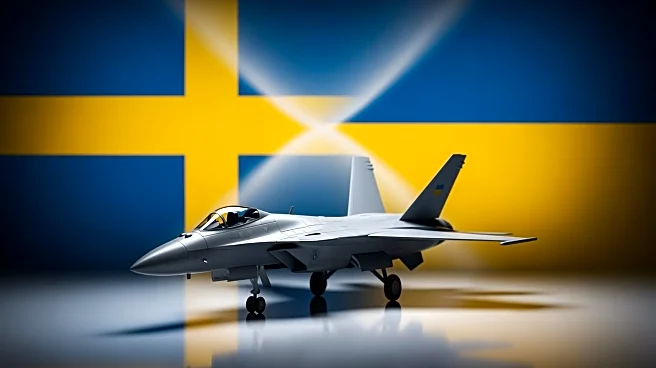What's Happening?
Ukraine is set to acquire Swedish Gripen-E fighter jets following the signing of a letter of intent between Ukrainian and Swedish officials. The agreement, announced on October 22, involves the potential export of up to 150 of these advanced fourth-generation
aircraft to Ukraine. Swedish Defense Minister Pål Jonson confirmed Ukraine's request for 100 to 150 jets, specifically the E variant, which is equipped with sophisticated electronic warfare capabilities. The Swedish government is currently exploring long-term financing options for this substantial order. Prime Minister Ulf Kristersson indicated that the first deliveries could commence in approximately three years, with the entire order potentially taking over a decade to fulfill. The Gripen-E jets are designed to operate from austere airstrips, providing Ukraine with a strategic advantage in its ongoing conflict.
Why It's Important?
The acquisition of Gripen-E fighter jets is significant for Ukraine as it seeks to bolster its defense capabilities amid ongoing military tensions. The advanced electronic warfare features of these jets will enhance Ukraine's ability to counter missile threats and conduct dispersed aerial operations. This development is crucial for Ukraine's military strategy, allowing for operations from shorter and less developed airstrips, which is vital given the current conflict dynamics. The deal also represents a deepening of defense ties between Sweden and Ukraine, potentially influencing regional security dynamics. For Sweden, this agreement could strengthen its defense industry and international standing as a supplier of advanced military technology.
What's Next?
The next steps involve Sweden finalizing the financing mechanisms for the deal and beginning the production of the Gripen-E jets. The Swedish government will likely engage in further discussions with Ukraine to outline the delivery schedule and operational integration of the aircraft into the Ukrainian Air Force. As the first deliveries are expected in three years, both countries will need to coordinate on training and logistical support to ensure the effective deployment of the jets. The broader geopolitical implications may prompt reactions from neighboring countries and international stakeholders, potentially influencing future defense collaborations in the region.
Beyond the Headlines
This agreement may have long-term implications for the European defense landscape, as it underscores the increasing importance of advanced air capabilities in modern warfare. The deal could also stimulate further innovation and investment in Sweden's aerospace sector, potentially leading to advancements in military technology. Additionally, the collaboration between Sweden and Ukraine might encourage other European nations to reassess their defense strategies and partnerships, particularly in light of evolving security challenges.















